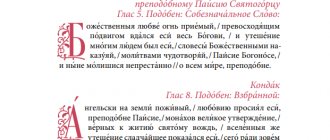In this work, using the example of the teachings of the Athonite elder Paisius, the general Christian foundations on which the relationship between husband and wife and between parents and children should stand were determined. In his teachings, Elder Paisios proceeds from ideas about the Divine establishment of the union of a man and a woman, the significance of the sacrament of Wedding for the formation of a family as a single organism, and the need for unified spirituality in the aspirations of husband and wife. At the same time, tuning the spiritual life of spouses to the “frequency of God,” as the elder wrote, is achieved through living together in the Church and the mandatory acceptance of the Church Sacraments. The elder also gives a definition of a marriage union, which can be called true only if the union of the spouses occurs together with God, since marriage is a triple union, sealed by the love of a man, a woman and God.
- 2.1. The problem of the influence of the world on the Christian family 7
Introduction
Active secularization processes in modern society have led to the formation of a distorted idea of family and marriage. The so-called civil marriage is considered the norm; families that strictly control the process of childbearing or completely abandon it, or families that promote open relations between spouses are widespread in a number of states (for example, Holland, some states in the USA and, more recently, France) legally allows registration of same-sex marriages.
No less acute is the question of the spiritual foundations of traditional families. Often people who get married do not have a clear idea of the goals and objectives of family life, the specifics of intrafamily relationships, or replace them with the norms and values of a modern secularized society or various religious teachings that are non-traditional for our country. Another extreme is the religious neophyte of a number of citizens who view the family as something that interferes with a truly spiritual life.
All these phenomena and processes are directly aimed at the individual, at destroying the holistic understanding of the marriage union. And people living in the world cannot help but be influenced by them.
In this regard, the Holy Tradition of the Church, which fully reveals the true teaching on family and marriage as set out in the Holy Scriptures, acquires special significance for Christians. But the problem is that there is a separation of modern Christians from such a significant component of Tradition as the patristic creations. The unusual style, the peculiar language of the holy fathers, and, most importantly, the lack of experience of spiritual life among the majority of people who consider themselves Orthodox lead to a misunderstanding of the instructions of the ascetics of Christianity. Finally, there are cases of conscious rejection of their works as written in another historical era, in other socio-cultural circumstances, and, therefore, useless for modern people. Thus, the lack of continuity of the spiritual experience of the holy fathers, as well as the realities of modern life, obscure the enduring relevance and significance of organizing life, including family life, according to the commandments of the Holy Scriptures.
In this regard, the attitude towards family and marriage contained in the teachings of the Athonite elder Paisius the Holy Mountain seems relevant. According to the ascetic, people’s removal from God, refusal to live according to the Gospel commandments and their own pride led to a deep spiritual crisis in family relationships. That is why Elder Paisios paid special attention to the topic of family and marriage. His teachings, presented in a language accessible to modern people, supplemented with living images and examples, clearly define the Gospel foundations of family life (generous, sacrificial love, mutual respect between spouses, patience, prayer, etc.), leading to a profound impact on the mind, heart and human soul.
Currently, there is a fairly significant number of works revealing the Orthodox teaching on family and marriage. In particular, in the preparation of this essay, the books of St. Theophan the Recluse “Salvation in Family Life” and Archpriest Gleb Kaleda “The Domestic Church: Essays on the Spiritual and Moral Foundations of Creating and Building a Family in Modern Conditions” were actively used. Well known in the Orthodox community, they are of particular value, presenting both general recommendations regarding the foundations of spiritual life in the family, and being narrowly focused, offering a model of behavior in a number of life situations. At the same time, in our opinion, their disadvantage is the insufficient disclosure of the idea that the main life of any person is life in God.
To reveal the Divine establishment of the family union, the article “Christianity and problems of sexual relations”, written by Archpriest Lev Shikhlyarov, was used, and the use of the works of Metropolitan Macarius of Moscow “Orthodox-dogmatic theology” and Pestov N. E. “Modern practice of Orthodox piety” made it possible to outline the main misconceptions regarding spiritual the foundations of family life that take place in the worldview of modern Christians.
To consider the peculiarities of raising children in Orthodox families, an article by Professor Ivan Aleksandrovich Ilyin “On Family and Education,” a famous Russian Orthodox philosopher expelled by the Soviet government in 1922, was used. into emigration.
We did not use works devoted to the work of Elder Paisius due to the fact that a short time had passed since the death of the elder, and no authors had yet appeared who systematized and analyzed his spiritual heritage.
Thus, the purpose of the proposed work is to identify and systematize the teachings of Elder Paisius on marriage and family life, which are reflected in his instructions.
Tasks of the upcoming work:
1). Determine the range of problems in the life of a modern family, touched upon by Elder Paisius in his teachings.
2). Show the role of spiritual leadership and the principles of oikonomia in the harmonization of family relationships.
3). Consider crisis situations that arise in a modern family and show ways to solve them, proposed by Elder Paisius.
The source for writing this work was a five-volume volume of teachings by Elder Paisius of the Svyatogorets entitled “Words” published in 2002 by the publishing house “Holy Mountain”, which became widespread among Orthodox people in modern Russia. No other sources were used.
The abstract consists of two chapters. The first chapter examines the spiritual foundations of family relationships, shows the importance of mutual obedience between spouses and spiritual leadership in the family, and also examines the teaching of Paisius the Holy Mountain on raising children. In the second chapter, an attempt is made to determine the main reasons for the manifestation of crisis situations in family relationships.
Holy Passion-Bearer Empress Alexandra
“How happy is a home where everyone - children and parents, without a single exception - believes in God together. In such a house there is a joy of camaraderie. Such a house is like the threshold of Heaven. There can never be alienation in him."
St. Rev. Nectary Optinsky
“Happiness in married life is given only to those who fulfill the commandments of God and treat marriage as a Sacrament of the Christian Church”
Archbishop Ambrose (Klyucharyov)
“The work of putting up with each other’s shortcomings in spouses is a right to gratitude from the party with the shortcomings to the other, who suffers them. This strengthens love, since the one with the disadvantage tries to console the indulgent friend with other, better qualities of his soul. Attention to the weakness and shortcomings of such a close person as a husband or wife arouses pity for him and confirms patience, which in itself is a virtue; In this virtue, a person who has Christian convictions, and for his own improvement, is obliged to exercise with zeal and constancy. He cannot abandon the one with whom he first lived with, living and clear love, then with love, according to the word of the Apostle, merciful, then with long-suffering love, and finally with love that believes in the fruits of patience and in the possibility of human correction, which sometimes happens beyond expectation. , with the special help of God's grace"
Righteous John of Kronstadt
“There are also unhappy marriages: sometimes husband and wife come together as if only for the sin and misfortune of both. Why are they unhappy? Mostly from the dissimilarity of characters, from mutual intransigence; from the obstinacy, arbitrariness and exactingness of the husband or from his impudent disposition or passion for the husband’s game; from the wife’s addiction to clothes, from her waywardness, anger, grumpiness, stubbornness, from the inability to tolerate shortcomings in life’s needs. May the Lord help you to avoid such dreamlike cohabitation and such marital troubles.”
to avoid this
“Always have faith and the fear of God in your heart: prudence, patience, hope; work and pray; go to bed and get up with prayer in your heart and on your lips; do not abandon church meetings; diligently fulfill annually the Christian duty of confession and communion of the Holy Mysteries of Christ. In these sacraments you will find, in addition to the grace of cleansing sins and sanctifying your souls and bodies, the grace of firm unanimity, sanctification in the very loins and in the womb of the future generation, renewal of spiritual and physical strength, help, consolation and encouragement in difficult everyday circumstances, healing of diseases »
St. John Chrysostom
“The husband especially belongs to those occupations and works that require great strength, physical or moral. The husband, as the head of his wife, must prudently guide her in all circumstances of life that require his help: with Christian meekness, notice and correct her shortcomings and prudently take care of her needs.”
apostle Peter
“Husbands treat their wives wisely, as with the weakest vessel, showing them honor as joint heirs of the grace of life.”
A husband should not treat his wife with disdain, much less contempt (for any of her misdeeds). The feeling of superiority - real or imaginary - has led to the fact that in many nations a woman occupies a humiliating and powerless position in the family (as opposed to our society, where she has arrogated to herself some rights that are not even due to her).
The way women are pushed aside and humiliated is observed in the history of pagan tribes, among savage peoples who remain within the boundaries of the ancient peremptory patriarchy, as well as among Muslims, with their polygamy.
But Christ gives an example of how women should be treated: after all, His Mother was blessed among women. Everywhere in the Gospel, wherever we see the appearance or presence of women, Christ is mercy itself, favor itself, kindness itself.
In essence, the wife is, without a doubt, equal to her husband in universal and moral virtues. She is just as capable of high concepts and spiritual achievements as her husband. So, even from the history of the Old Testament, we know that Jewish wives knew how to both sing and compose solemn songs: Mariamne, Aaron’s sister, directed the choir; this choir sang a “song of victory” after the Jews crossed the Red Sea. In the New Testament we see a woman, equally with a man, capable of everything religious and moral. And these, of course, are the most important human abilities. They are more important than sciences, arts, trade, etc. For example, the Samaritan woman theologizes in a conversation with the Savior; Martha, Lazarus's sister, speaks with confidence about the general resurrection; a woman’s voice, and no one else’s, from the crowd of people in a feeling of delight before the preaching of the Savior ... says: blessed is Your womb and the breasts that nourished You.
Moreover, in the spiritual exploits of the New Testament times, women, not men, managed to show themselves first; an example of this is Mary Magdalene and other wives during the way of the cross and at the very cross of the Savior. And in all subsequent times, among the wives there were those who were zealous for matters of salvation... for example, they contributed to Christian missions (the wife of the Apostle Peter accompanied him to Rome; among them not only ascetics like Mary of Egypt are known, but also writers of ascetic works (Sinklitikia) and for divine services ( Cassia, who wrote the irmos of the canon “By the Wave of the Sea...” up to the 6th canto and other works).
The husband must remember that his wife, according to God’s establishment, is his helper. Therefore, in all important family matters, his duty instills in him to consult with his wife, both in order to receive help from her, and in order to show her decent honor, and through this, maintain a proper attitude towards her and maintain mutual consent and love. When the wife, as her husband's helper and friend, gives him her opinions and advice, the husband should listen and accept them with attention and respect. And in that case, when, according to thorough reasoning, the wife’s hair cannot be accepted, the husband should not refuse his wife decent attention, so as not to offend her and thereby violate her rights. True Christian love and prudence will show when and how a husband should act under such circumstances.
Even if your wife sins a lot against you, forgive her everything. If you take a malicious one, teach her kindness and meekness; if there is a vice in your wife, cast him out, not her.
Woman in particular is endowed by nature with a sense of decency, taste and grace. But since man distorts every naturally pure feeling through his unreason and sin, this feeling in many women is excessive and perverse. Hence their vanity in everything, from flowers to dresses, from the reception of an everyday guest to festive evenings. It's not just about spending on unnecessary things, but also about the emptiness of what women want, what they like, as well as the momentary need for some of the things they want.
Most of all, the vanity of women is manifested in their outfits: the first conversation they have when they meet is about outfits; their first curiosity is to look at the renovations in the living room; Some of their clothes are so bizarre that they can be liked only for the sake of vanity or because of fashion alone. And the whole human race is vain, and women especially. An elderly wife, and in the event of a gift or reward from her husband for any work, does not want anything for herself except silk and velvet. But since this vanity of wives requires expenses, then the husband must be responsible here too. A rich husband spends money endlessly on his wife's whims. And the man of little means gives his last to his wife with a sigh - just to please her. If this (means) is not available, then some decide to make mischief, for example in their position, in order to fulfill the desires of their wives. For example, Jezebel really liked Naboth’s garden, and Ahab, her husband, decided to purchase her favorite gift at the cost of the blood of the innocent owner of the garden.
A prudent husband must stand firmly against the whimsical desires and demands of his wife, must deviate her from vanity, which harms her and him economically and morally.
Finally, subservience to other wives reaches the point of misogyny. To adore even a legitimate wife in the female sex is a sin. The very word “adore” is a sin, because it means: to see God in someone else other than God Himself. Moreover, the matter itself in this case is criminal, because a person is given what is due to God. Misogyny perverts the correct relationship between spouses.
Here are examples of subservience to your wife that are worthy of laughter and regret. Darius, the king of Persia, the woman hit him on the cheeks, forcing him to laugh at her laughter and take care of herself when she was out of sorts or angry, took off his royal crown when he was sitting on the throne, and put it on herself.
As soon as the rights and influence on the wife on the part of the husband are weakened, the wife is forgotten, begins to rise up and abuse: this is the same as allowing water to pass. Does a husband want to make sure of his wife's weakness? Just let him weaken his attitude towards her, give her complete freedom in everything - and he will come to a sad realization.
Thus, seriousness and to some extent severity is the most correct attitude of a husband towards his wife!
On the other hand, a husband weakened by his former free life and the vices acquired in it is a heavy cross for his wife.
A woman, having a more sensitive heart than a man, is able, precisely with the help of feeling, to quickly and correctly assess tense situations that arise from time to time in the family. No one can find the right words like her to, for example, justify her husband’s behavior in front of his children, even if it is not exemplary in some way. In general, she should not emphasize his shortcomings in front of the children, but always stand up for him. Perhaps, let’s say that he shouted, was unfair or did not come completely sober - she should explain this to the children by saying that he works a lot, trying for them, that he has accumulated fatigue.
Sirach praises the pious wife.
Saint John Chrysostom
“First of all, honor God, and then your spouse - the eye of your life, the director of your intentions. Love him alone, make your heart happy, and all the more so since he has the most tender love for you; under the bonds of unanimity, maintain an unbreakable affection... Having been born a woman, do not assign to yourself the importance inherent in a man; Do not be proud of your birth, do not be puffed up in your clothes or in your wisdom. Your wisdom is to obey the laws of marriage, because the knot of marriage makes everything common between the wife and her husband...
... You, wife, also have your responsibilities. You must know them and execute them with constant attention and zeal. This is a necessary condition for your happiness... Even if a wife sometimes surpasses her husband in moral qualities, education and experience, even in this case she does not have the right to go beyond the limits established by God’s law, but must always sacredly preserve in her soul and show in practice decent respect to my husband...
... When your husband is irritated, give in to him; and when you are tired, help with gentle words and good advice. And the lion tamer does not by force subdue the enraged beast, whose breathing is interrupted in rage, but tames it by stroking it with his hand and saying kind words.
No matter how irritated you are, never reproach your spouse for the damage you have suffered, because he himself is your best asset. Do not reproach him because the end of the matter is contrary to his enterprise. This would be unfair, because, according to the trick of the demon, often prudent undertakings do not achieve their goals. Don’t reproach him for lack of strength either, because there is always strength in the sword...
Whom your husband does not love, do not praise him with the cunning intention of inconspicuously hurting your husband with a word. Noble husbands and wives, and especially wives, in any case, are befitting of simplicity of heart.
Consider all your husband’s joys and sorrows to be common. Let your worries be common, because through this the house grows. And your advice may take place, but the husband must be in charge.
When your husband grieves, grieve with him a little, and soon afterwards, putting on a bright face, dispel his sad thoughts, because for a mourning husband the most reliable haven is his wife.”
Holy Righteous Alexy Mechev
“You need to calm your husband down, protect him from all sorts of troubles, live his life, forget yourself completely - everything is for him. And one must approach the soul quietly, tenderly, like some just blooming flower. And there should be one thought in your head: how not to disturb him, how not to offend him, how to console him, how to calm him down. There should be no harshness: everything is soft, everything is loving, everything is warm.”
St. Gregory the Theologian
“Allow yourself not such liberty as your husband’s love calls you to, but such as is proper; because satiety is possible in everything. But although there is satiety in everything, it is better to have a love that does not know it...
...There should be no lustful movements or angry tremblings on your cheeks. This is shameful for every person, especially for a woman, and makes the face ugly...
... If your tongue is not curbed, you will always be hated by your husband. An insolent tongue has often caused harm to the innocent. It is better to remain silent when the matter itself calls for a word, than to speak when the time does not allow room for an immodest word. Let your word remain an object of desire.
Listen to this too: do not indulge in uncontrollable carnal love, do not seek the pleasures of the marital bed at all times; Convince your spouse to respect holy days; because it is human nature, as the image of the great God, to obey the laws...
...A wife must obey her husband in everything, incline her disposition in every possible way to his disposition and be completely devoted to him, so that neither in deed nor in thought does she even think of anything without his will... therefore, it is correct to carry out all his orders, advice, commands, and not even in thought allowing him to someday put on his own... Her duty is to do what is due; seeing any discord, say and restore, or make up for it”
St. Feofan the Recluse
“The duty falls on her (the wife) ... to graciously endure the severity and all the oddities of her husband’s character, to support the declining strength of his spirit, to diversify and elevate his joys ... to instill in her environment the spirit of peace, harmony and love. And all this - what high virtues it demands from her - what prudence, what forethought, what meekness, what patience, what love! And how much more bitterness, ingratitude, annoyance, insults and infidelity she will then have to re-experience and feel! We can generally say that the family good should be redeemed by her suffering. The appointment of a wife is so important!”
Hieromonk Porfiry (Levashov) letter to his spiritual daughter
“... if your husband was really bad, then ask yourself in conscience before God: “Am I, a sinner, worthy of a good and kind husband?” And your conscience will certainly say that you are absolutely not worth anything good, and then in humility of heart, with submission to the will of God, you will love him from your heart and find a lot of good things that you have not seen before.”
But why does a woman have so much responsibility?
A wife, by the depth of her heart organization, and by the “wisdom of the heart,” as well as by her special intuition, warmth, grace, tenderness, more than her husband, can be the bearer and guardian of peace, and, in consonance with this word, “myrrh-bearer “—that is, the bearer of fragrant holiness, the planter of precious harmony.
G. Shimansky
Life has shown that the implementation of emancipation inevitably leads to a woman losing many of her inherent good qualities, to the deterioration of the condition of families and their destruction, to the neglect of children, the lack of proper upbringing, and to an increase in crime among young people. All this has a detrimental effect on the state of states and humanity.
A woman is not without influence on public life, but her influence is not direct, it is mediated by raising children. If a mother raises her children in good morality, instills in them a love for the Church and the Fatherland and the skills for honest work, then she prepares useful figures for society and the state and provides them with a great service - much greater than if she becomes a civil servant or a scientific and technical worker .
St. John Chrysostom
“Since equality often leads to quarrels, God has established many types of superiority and subordination, such as: between husband and wife, husband and father, between an old man and a young man, between a superior and a subordinate, between a teacher and a student.”
St. Feofan the Recluse
“God appointed the husband to be the guardian of his wife. And often, without realizing it, he gives permissions or prohibitions to his wife such as God inspires him.”
Sirach
“It will be annoyance, shame and great disgrace when a wife prevails over her husband.”
Apostle Paul
“Wives, submit to your husbands as to the Lord, because the husband is the head of the wife, just as Christ is the head of the Church, and He is the Savior of the body. But just as the Church submits to Christ, so do wives to their husbands in everything... Let each of you love his wife as himself; but let the wife be afraid of her husband."
St. John Chrysostom
“A virtuous, pious and reasonable wife is most likely to educate her husband and make him pious. He will not listen to friends, teachers, or bosses as much as he listens to his wife. When she exhorts and gives advice, this exhortation also gives him some pleasure, because he loves this adviser very much. And many cases can be pointed out in which stern and indomitable husbands were softened in this way. The wife participates with her husband in everything, in meals, in the birth and upbringing of children, in his affairs and interests, and in very many other things; she is devoted to him in everything and is united with him like the body with the head. And if she is reasonable, thrifty and diligent, if she is not malicious, ill-natured, quarrelsome, wasteful, and does not look for vain decorations and outfits, but instead looks for modesty, chastity, kindness and meekness, unanimity and family harmony, then everyone will burst into tears. in influencing her husband, and by doing this she herself will make her husband even more well-behaved and kinder to herself.”
Priest Alexander Elchaninov
“It is said about a woman - “infirmior vasa” - “infirmior vasa” - This “infirmity” consists mainly in the woman’s subjection to the natural elements within herself and outside of her.
Because of this - weak self-control, irresponsibility, passion, blindness in judgment. Almost no woman is free from this; she is always a slave to her passions, her aversions, her “wants.” Only in Christianity does a woman become equal to a man, subordinate her temperament to higher principles, and acquire prudence, patience, the ability to reason, and wisdom. Only then is her friendship with her husband possible.”
Anthony of Sourozh
“The husband is the head of the family not because he is a man, but because he is the image of Christ, and his wife and children can see this image in him, that is, the image of boundless love, devoted love, self-sacrificing love, love that is ready for everything to save, protect, nourish, console, delight, and educate your family. Every person should remember this. It is too easy for a man to think that just because he is a man, he has rights over his wife, over his wife and over his children. It is not true. If he is not the image of Christ, then no one owes him any respect, no fears, no obedience.”
St. John Chrysostom
“A servant can be bound by fear, but, more likely, you can’t bind him either, he will jump away and run away - but the companion of life, the mother of children and the cause of all joys must be tied to oneself not with fear and threats, but with love and affection. What kind of marriage is it when the wife trembles at her husband? What pleasures can a husband enjoy when he cohabits with his wife as a slave, and not as a free woman?
St. Gregory the Theologian for husbands
“Be patient and wise, you who have taken upon yourself the yoke of marriage. If you see that your wife has put on make-up or make-up, erase it; or she has a arrogant tongue - chastity; if the laughter is obscene, make it modest; if you notice excess in spending and drinking, limit it; if it is unreasonable to leave the house, put a barrier; if the gaze is distracted, correct it; but do not cut off, without hastily excommunicating, for it is not known who is in danger - the excommunicator or the excommunicated"









